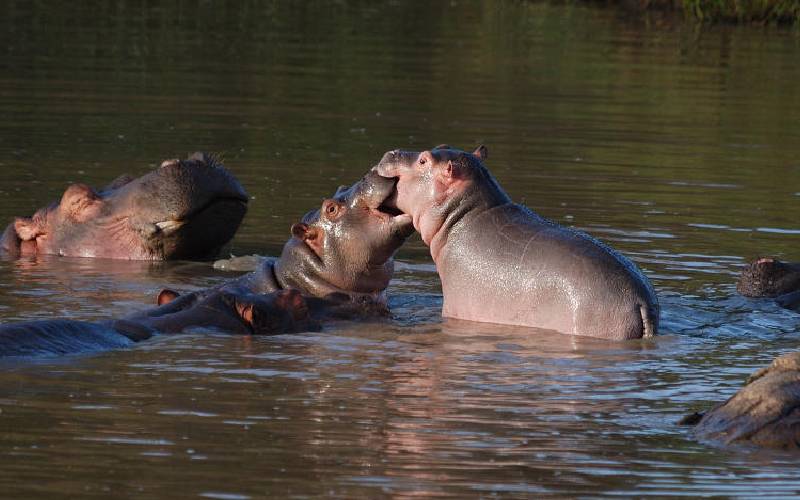
A family of hippos plays at the banks of Ewaso Ng'iro.
Hippopotamus faeces from Mara River has been identified as vital for the survival of major lakes in East Africa due to their unique feeding patterns.
The poop from tens of hippopotamuses transport unique nutrients from land to water sources not only in Kenya, but also Uganda and Tanzania.
A 2019 research published at Science Advances on May 1 highlights hippo poop as the source of silicon, which is critical in supporting food chains in Mara River and other lakes the river drains into. The Mara River supports one of the eight wonders of the world.
“About half of this silicon ended up in the water when the grazers excreted. Further calculations showed that the hippos alone contributed to more than 76 per cent of the silicon transported along the Mara River. In short, hippos act as silicon pumps,” the researchers noted.
More than three-quarters of the Mara River’s silica stems from droppings left by hippos, who spend half of their day eating on land and the other half cooling off and pooping along the river. And while other grazing animals consume roughly the same amount of grass as hippos, they spend less time in the water compared to hippos, the unsung heroes.
Every day, hippos in Mara River excrete 880 pounds of the nutrient that contains silica, which helps algae thrive, ensuring the survival of both the aquatic plants and that of the many organisms reliant on algae as a key food source.
Other East African lakes highly dependent on silica from hippo poop include Victoria and Albert, Malawi and Tanganyika.
Most rivers draining into Lake Victoria, however, have been cleared of hippo populations, which are currently confined to the mouths of major rivers and coastal areas.
And although the hippo population is said to be declining, the researchers say hippo densities in the Mara River remain the largest single population on the African continent and representing three per cent of the total population.
“Unintended downstream repercussions to Lake Victoria and other Rift Valley lake ecology are possible if hippos are removed from the Savannah ecosystem,” the researchers noted.
Hippos have significantly decreased by seven to 20 per cent from 1996 to 2004, according to researches. Due to the present challenges of hunting and habitat loss that continue to threaten the hippos, it is expected that populations will further decrease by 30 per cent over the next three generations.
The decline of ‘silica pumps’ is expected to spell doom as they stop carrying silica from the savannahs to rivers and lakes, triggering the rise of toxic species such as “life-suffocating” bacteria blooms.
“Eventually, these silica-deprived marine ecosystems could even become “environmental dead zones”, the report notes.
The research points out that if Mara is stripped of hippos, there will be massive repercussions to Lake Victoria and other Rift Valley lakes.
 The Standard Group Plc is a multi-media organization with investments in media platforms spanning newspaper print
operations, television, radio broadcasting, digital and online services. The Standard Group is recognized as a
leading multi-media house in Kenya with a key influence in matters of national and international interest.
The Standard Group Plc is a multi-media organization with investments in media platforms spanning newspaper print
operations, television, radio broadcasting, digital and online services. The Standard Group is recognized as a
leading multi-media house in Kenya with a key influence in matters of national and international interest.











